May 30, 2025 | 08:51 GMT +7
May 30, 2025 | 08:51 GMT +7
Hotline: 0913.378.918
May 30, 2025 | 08:51 GMT +7
Hotline: 0913.378.918
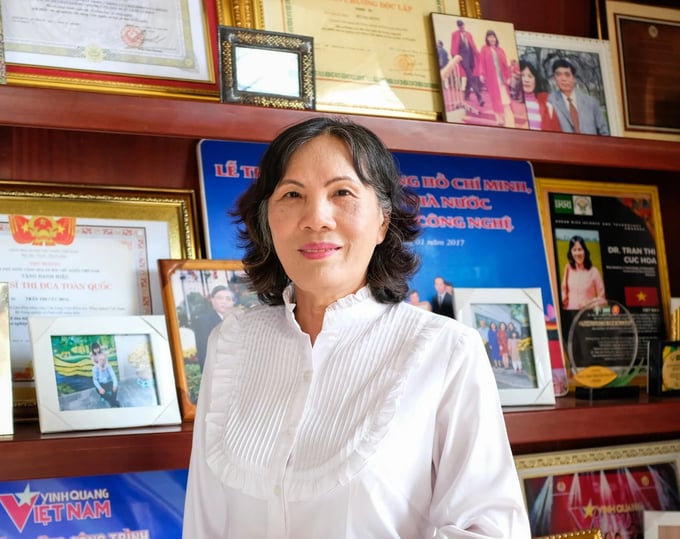
Associate Professor Dr. Tran Thi Cuc Hoa, the researcher behind rice varieties currently cultivated across more than 40% of the rice-growing areas in the Mekong Delta. Photo: Quynh Chi.
We had the opportunity to sit down with Associate Professor Dr. Tran Thi Cuc Hoa, the researcher behind rice varieties currently cultivated across more than 40% of the rice-growing areas in the Mekong Delta. Our discussion centered on the emerging trends in high-quality rice research, particularly focusing on varieties to be adapted thrivingly in the diverse ecological conditions.
Associate Professor Dr. Tran Thi Cuc Hoa is the leading scientist of three prominent rice varieties: OM5451, OM18, and OM380, widely cultivated in the Mekong Delta today. According to data from the Department of Crop Production, in 2023, the cultivation area for the OM18 variety reached 881,525 hectares, OM5451 covered 645,213 hectares, and OM380 spanned 72,028 hectares.
The combined cultivation area of these three varieties surpasses 1.6 million hectares, constituting over 40% of the total rice cultivated area in the Mekong Delta. These rice varieties have significantly transformed the landscape of rice varieties in the region, promoting high quality, high yield, shorter growth cycle, wider adaptability, and bolstering Vietnam's position in rice exports. Current records indicate that the OM5451 variety has even been adopted officially in Cambodia (with seeds exported from Vietnam), and unofficial reports suggest it is planted in Thailand as well.
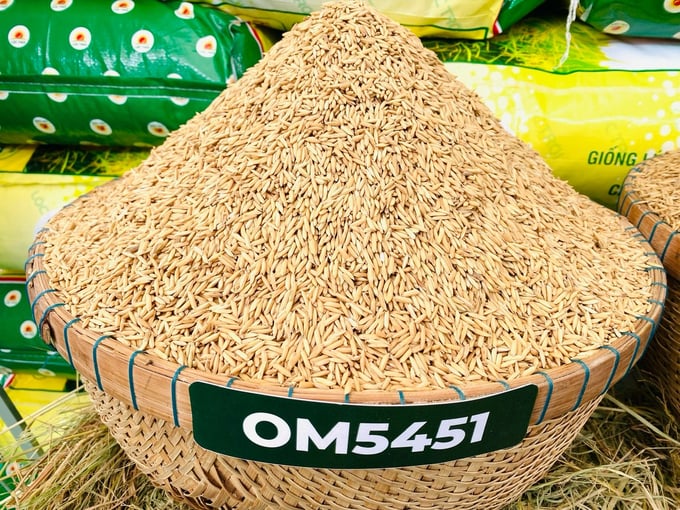
The OM5451 variety has even been adopted officially in Cambodia.
Following her university graduation, Associate Professor Dr. Tran Thi Cuc Hoa commenced her career at Mekong Delta Rice Research Institute in 1980. In 1988, she was awarded an ITEC scholarship by the Indian government to pursue her Master's and Ph.D studies in India. Subsequently, she received a scholarship from the Rockefeller Foundation to conduct post-doctoral research at Purdue University (USA) and the Swiss Federal Institute of Technology (ETH). Upon her return to the Mekong Delta Rice Research Institute, she actively engaged in research, teaching, and capacity-building endeavors.
The Vietnam Agriculture Newspaper conducted an interview with the esteemed breeder of the renowned OM rice varieties, reflecting on the evolutionary journey of Vietnamese rice over the past decade.
- Madam, the rice varieties you have developed over many years have reached around 1 million hectares in the Mekong Delta and extended to other countries in the region. Could you elaborate on researching and selecting these exceptional rice varieties?
Dr. Tran Thi Cuc Hoa: At the Mekong Delta Rice Research Institute, I was appointed as the Head of the Department of Biotechnology, tasked with researching gene technology (focused on rice and soybean) and developing rice varieties oriented towards high quality. This direction stemmed from inheriting the outcomes of an international research project on breeding nutritious rice varieties funded by the Asian Development Bank (ADB) and managed by the World Food Policy Research Institute (IFPRI). Since 2002, developing nutritious rice varieties has been a ministerial-level research priority. This endeavor led to developing two iron-rich rice varieties, OM6976 and OM5451, which gained official recognition in 2011 following a decade of research and testing. From 2011 onwards, the OM5451 rice variety has been extensively cultivated for production.
The success in rice breeding, as demonstrated by the experience with OM5451, underscores the need for a continuous, long-term research process. This involves a careful selection of parent varieties for hybridization, drawing from previous research on iron-rich rice varieties. For OM5451, the parent strains were iron-rich varieties (identified from evaluating 400 rice varieties) and Jasmine 85, a fragrant rice variety known for its soft grains. Our research team comprises individuals who are not only passionate and dedicated to their work but also deeply connected to the fields. We have forged strong partnerships with localities to conduct extensive field tests across various ecological regions, consistently engaging in on-site evaluations.
OM5451 is renowned for its exceptional resistance to pests and diseases, particularly during the summer-autumn crop season. Despite the outbreak of brown planthoppers, yellow dwarf and rice-ragged stunt diseases in the Mekong Delta during 2005-2006, OM5451 exhibited remarkable resilience under disease-infested conditions. This selection, perhaps, also owed something to fortuitous circumstances. Nevertheless, our pursuit has been steadfast, aiming at breeding varieties characterized by high quality, short growth cycles, high yields, and wide adaptability.
- Madam, alongside the OM5451 variety, you are also the primary developer of the OM18 rice variety, which has become a cornerstone in both production and export in the Mekong Delta. Could you share more about this rice variety?
Dr. Tran Thi Cuc Hoa: The OM18 variety stands as a complement to the OM5451 variety, boasting superior quality, a delicate fragrance, enhanced salt tolerance, and notably, exceptionally high yields, despite having a slightly longer growing period by about 3 days compared to OM5451. OM18 represents a remarkable amalgamation of various outstanding traits into a single variety, earning preference among farmers and proving highly sought-after for export purposes.
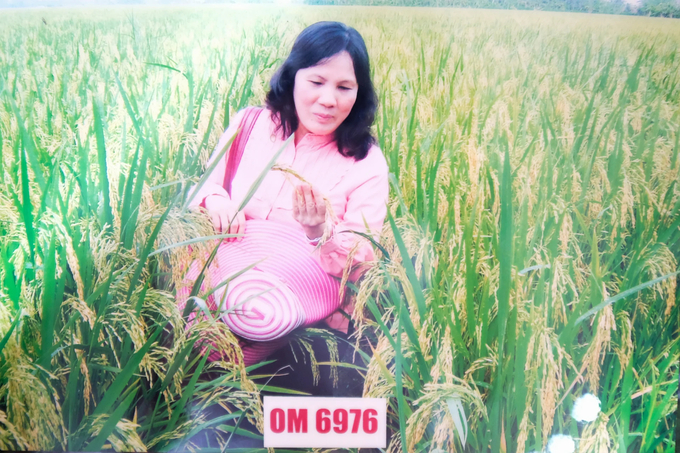
Dr. Tran Thi Cuc Hoa conducting on-sight research.
- It is understood that researching rice varieties to adapt to the changing conditions in the Mekong Delta poses significant challenges. Some rice varieties may exhibit good salt tolerance but adapt poorly under acid sulfate conditions, and vice versa. Could you elaborate on some of the difficulties encountered during your work?
Dr. Tran Thi Cuc Hoa: Rice scientists, particularly the research team under my guidance, have worked with dedication and passion in developing high-quality rice varieties that align with market demands and possess the ability to thrive across various soil and climatic conditions.
In addition to conducting laboratory analyses to assess grain quality and pest resistance, we also engage in collaborative variety selection efforts. During challenging periods such the epidemics of the brown planthopper, and yellow dwarf and rice-ragged stunt diseases that afflicted the Mekong Delta between 2005 and 2006, we identified the strain OM5451 showing high resistance. This underscores the pest-resistant capabilities of the OM varieties, particularly in the summer-autumn crop season.
Our experience highlights the complexity of developing rice varieties highly tolerant to adverse environmental conditions like salinity, drought, and acid sulfate conditions due to the intricate genetic characteristics associated with these traits. While research publications may indicate high levels of tolerance, the reality in the fields often differs. Our research team paid more attention on wide adaptability, while achieving the desirable level of tolerance proved challenging, perhaps by pursuing this approach, the varieties like OM5451 and OM18 have been planted extensively, even transcending borders into other countries.
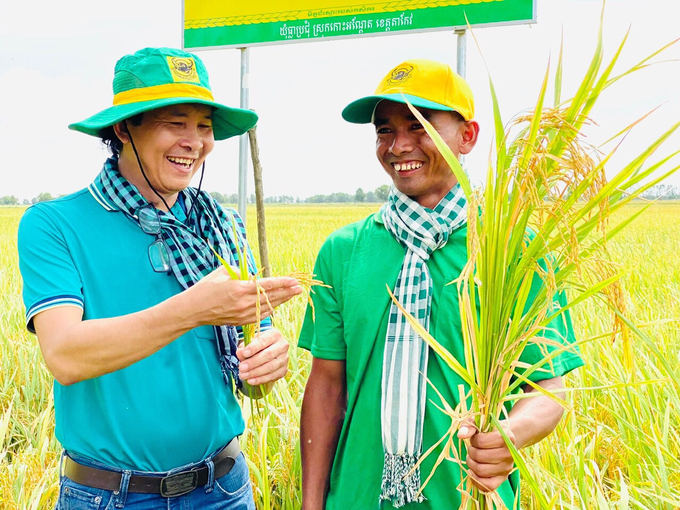
OM5451 and OM18 have been planted extensively in other Southeast Asian countries.
- Reflecting on the success stories of OM5451 and OM18, what are your thoughts on translating research outcomes into market successes and staying ahead of market demands?
Dr. Tran Thi Cuc Hoa: I would like to underscore once more that the process of rice breeding necessitates ongoing research and unwavering perseverance. While identifying production and market trends, we meticulously select suitable parent varieties to ensure that the new breeds precisely meet the requirements.
Since 2008, we have focused on researching and developing high-quality rice varieties to meet export demands. However, during that period, there was limited research on enhancing the nutritional quality of rice, leaving rice varieties globally rich in energy but deficient in essential micronutrients.
Consequently, the Mekong Delta Rice Research Institute embarked on the project 'Research on creating rice varieties rich in micronutrients with high yield and quality.' The objective of this initiative is to develop new rice strains with high iron content, addressing malnutrition issues in Vietnam and the wider region. Simultaneously, these varieties are designed to attain high productivity and resilience to pests and diseases, augmenting farmers' incomes.
The effective collaboration between the Research Institute and businesses is crucial for bringing rice varieties to the market. In the case of the aforementioned varieties, there has been successful cooperation between the Mekong Delta Rice Research Institute and the Loc Troi Group. It's fair to say that businesses investing in seed production have empowered scientists to realize their aspirations. Large-scale seed production, ensuring quality standards, is a task that cannot be achieved without the involvement of businesses. Moreover, businesses play a pivotal role in providing market insights that guide collaborative research efforts, exemplified by the ongoing partnership between the Mekong Delta Rice Research Institute and various enterprises.
- The ambitious project of cultivating 1 million hectares of high-quality and low-emission specialized rice in the Mekong Delta encompasses numerous significant objectives, including the development of short-growth duration, high-yield, and high-quality rice varieties. Could you elaborate on the approach adopted by rice scientists at the Mekong Delta Rice Research Institute to achieve this goal?
Dr. Tran Thi Cuc Hoa: Serving the socio-economic development agenda through research constitutes a fundamental mission in the realm of rice breeding at our Institute, a legacy passed down through multiple generations of dedicated staff. This steadfast commitment has yielded tangible results, exemplified by the widespread adoption of rice varieties developed by the Mekong Delta Rice Research Institute, bearing the distinguished 'OM' designation, which have come to dominate large swaths of production and serve as crucial exports.
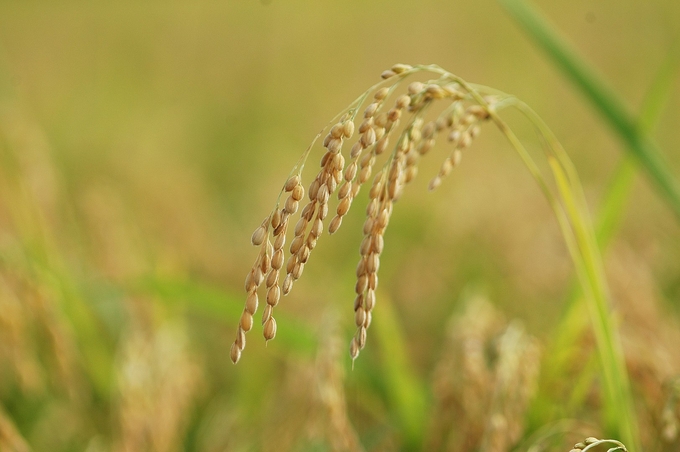
Presently, the rice hub of the Mekong Delta confronts a multitude of interwoven challenges stemming from climate change. The sustainability of rice production in this region is increasingly imperiled by escalating salinity levels, with recent years witnessing severe incidents, epitomized by the devastating impact of saltwater intrusion during the winter-spring crop of 2015-2016, resulting in extensive rice damage across hundreds of thousands of hectares affected by saltwater intrusion.
Simultaneously, the evolving dynamics of the export rice market present fresh opportunities, with global preferences shifting towards aromatic, tender, translucent-grained, and nutritious rice varieties, including those fortified with disease-resistant characteristics, and more recently, low-carbon rice.
Consequently, the imperative to develop fragrant, short-duration, high-yield, and premium-quality rice varieties that exhibit resistance to pests while boasting broad adaptability has never been more pressing. The synthesis of multiple superior traits within a single variety necessitates leveraging the latest advancements in biotechnology.
- From a scientific standpoint, how would you assess Vietnam's capacity in rice breeding?
Dr. Tran Thi Cuc Hoa: Vietnam's prowess in rice breeding can be broadly regarded as reaching an advanced level within the region and on the global stage. Rice varieties developed by the Vietnamese scientists consistently exhibit exceptional traits, characterized by short growth cycles, superior quality, and high yields. Notably, recent advancements have led to significant enhancements in quality, exemplified by the varieties like ST25, which Dai Thom 8 and OM18.
When viewed through the lens of scientific research, we observe a diverse array of structures and operational models. Ranging from institutions like the Mekong Delta Rice Research Institute—serving as the state's scientific arm—to private enterprises such as the Loc Troi Group, Vietnam Seed Group (Vinaseed), Thai Binh Seed Group (Thai Binh Seed), and specialty brands like Ong Cua Rice ST25, all are united in pursuit of a common objective: fostering development and making positive contributions to the nation's prosperity.
The quality of rice varieties is not merely evidenced by scientific accomplishments but also validated by the reputation of Vietnamese rice in the global market. These indicators are resoundingly clear, especially as in the world market, the price of Vietnamese rice surpass that of Thailand, India, and Pakistan—renowned as the world's leading rice-exporting countries.
These are indeed encouraging signs. I firmly believe that Vietnam's foundation in rice breeding is robust, providing the impetus for further strides in development.
- As a prominent figure in the previous generation's rice research field, what are your expectations for the future of Vietnam's rice science industry?
Dr. Tran Thi Cuc Hoa: I envision significant progress for Vietnam's rice science industry through the pursuit of multiple objectives and extensive collaboration.
First and foremost, to foster a sustainable rice industry, we must prioritize long-term research endeavors, foster innovative ideas, and harness advanced techniques. This will serve as a catalyst for domestic scientists to continue their valuable contributions to the nation, elevating the value of Vietnamese rice to unprecedented heights.
In this regard, the government must escalate investments in rice research, forging collaborative mechanisms with both domestic and foreign private enterprises. Ample resources will bolster high-caliber research projects, facilitate the development of new rice varieties, and enhance production processes.
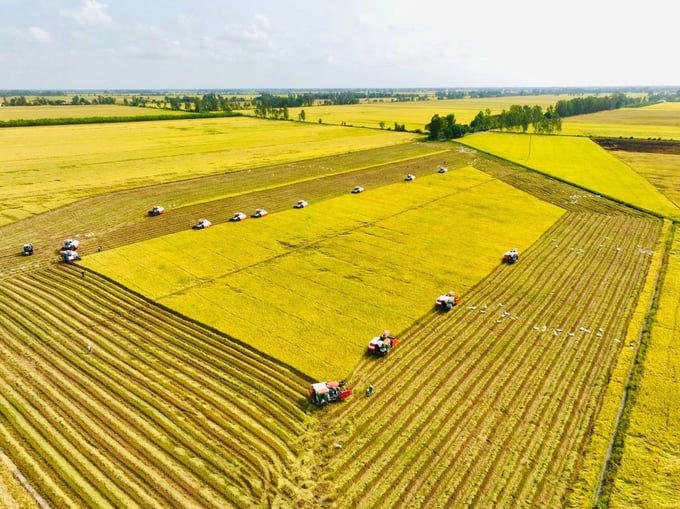
Dr. Tran Thi Cuc Hoa: "To foster a sustainable rice industry, we must prioritize long-term research endeavors."
The synergy between the public and private sectors must be further strengthened with flexible and innovative work mechanisms, encouraging researchers to generate unique ideas, and fostering interdisciplinary collaboration. Additionally, offering competitive income to scientists will serve as a crucial incentive, retaining talent and sustaining agricultural advancement.
Investing in the training of research personnel stands as a linchpin in nurturing and expanding human resources within institutes and educational institutions. Cultivating a cadre of highly skilled experts will chart the course for the industry's future, ensuring the continuity of scientific progress.
Furthermore, international cooperation holds immense significance in providing farmers, localities, and our scientists with access to cutting-edge technologies. Beyond enhancing the nation's scientific prowess, exchanging professional experiences fosters an open image within the global community.
The synchronized and effective implementation of these initiatives will propel Vietnam's rice science industry to unprecedented heights, equipping it to navigate the challenges and seize the opportunities presented during the country's comprehensive development phase.
Dr. Tran Thi Cuc Hoa has been duly recognized for her invaluable contributions to rice breeding research, thereby fortifying both domestic food security and enhancing Vietnam's position in the global export market. Her remarkable achievements have been acknowledged through numerous prestigious accolades, including Certificate of Merit from the Prime Minister (2008), First Vietnam Golden Rice Award (2012), National Emulation Soldier title (2014), Second Class Labor Medal (2016), State Award for Science and Technology (2017), Title of ASEAN Rice Science and Technology Ambassador (2017), Vietnam Glory Award: Imprint of Works (2018).
Translated by Quynh Chi
/2025/05/25/4127-3-073637_820.jpg)
(VAN) Thanks to the promotion from an FAO-implemented project, vegetable production in greenhouses in Moc Chau has seen strong development, from 1.5 hectares in 2021 to nearly 50 hectares in 2024.

(VAN) FAO has recently supported USD 140,000 to implement the project 'Risk mitigation human-animal interface risks through disease control initiatives in pig farming.'

(VAN) The People's Committee of Tra Vinh province has approved an adjustment to the investment policy for the Green Hydrogen Plant project, increasing its area to approximately 52.76 hectares.
![Reducing emissions from rice fields: [2] Farmers’ commitment to the soil](https://t.ex-cdn.com/nongnghiepmoitruong.vn/608w/files/news/2025/05/05/dsc08881jpg-nongnghiep-140632.jpg)
(VAN) Clean rice cultivation model in Thuong Tan commune, Bac Tan Uyen district, is assisting local residents in achieving sustainable agriculture by substantially reducing costs, increasing productivity, and protecting the environment.

(VAN) At the conference to disseminate Resolution No. 68, AgriS introduced its digital agricultural ecosystem and reaffirmed its commitment to accompanying the Government in promoting private sector development and sustainable agriculture.

(VAN) 'Blue Ocean - Blue Foods' initiative is designed to restore marine ecosystems and establish sustainable livelihoods for local communities by cultivating a minimum of 1,000 hectares of cottonii seaweed in the first three years.
/2025/05/21/4642-3-112707_603.jpg)
(VAN) The V-SCOPE project has made direct contributions to three out of six pillars of the Comprehensive Strategic Partnership between Vietnam and Australia.